MercoPress. South Atlantic News Agency
Economy
-
Friday, October 16th 2015 - 08:03 UTC
World's commercial fleet with lowest annual growth in a decade during 2014, says UNCTAD
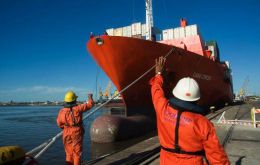
The world's commercial fleet grew by 3.5% during the 12 months to Jan 1, 2015, the lowest annual growth rate in over a decade, the United Nations Conference on Trade and Development (UNCTAD) reveals in its Review of Maritime Transport 2015.
-
Friday, October 16th 2015 - 07:43 UTC
Fitch cuts Brazil's credit rating to the brink of junk; “terrible” news says government
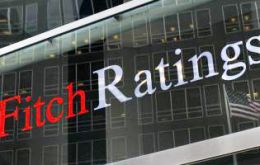
Fitch Ratings cut Brazil's credit rating to the brink of junk, warning the country could soon lose its coveted investment grade rating as government finances deteriorate amid a prolonged recession and persistent political uncertainty.
-
Friday, October 16th 2015 - 07:35 UTC
Petrobras strikes further discovery at giant pre-salt Libra field in Santos basin

Petrobras announced a further hydrocarbon discovery at the giant pre-salt Libra field in the Santos basin, offshore Brazil. The company said that well 3-BRSA-1310-RJS, in the central portion of the block, identified the presence of hydrocarbons in a low-porosity reservoir. This is the fourth well drilled in the Libra area since exploratory drilling began last August.
-
Friday, October 16th 2015 - 07:26 UTC
Respsol selling assets, slashing investments and cutting working force 6%

Spanish oil giant Repsol said on Thursday it plans to sell 6.2 billion Euros ($7.1 billion) in assets and slash investment in exploration and production over the next five years to help its preserve dividends and pay back debt.
-
Thursday, October 15th 2015 - 20:16 UTC
China to continue expanding its influence in the oil and gas sector

Since 2009, China has been taking a much more active role in its pursuit of international oil contracts. In 2009, for the first time, Saudi Arabia exported more of its oil to China than it did to the US. China also made large investments in Saudi Arabia's oil refining industry as well. But China's oil investments didn't stop there; they also pursued oil producing Canadian assets in 2011/12.
-
Thursday, October 15th 2015 - 07:10 UTC
Argentine September inflation 1.92% and 25.91% in last twelve months

September inflation in Argentina was 1,92% and reached 25.91% in the last twelve months according to the monthly report from opposition members of Congress, which is based on the average of the country's leading private consultants. Later this week the official Indec rate is expected to be announced, systematically lower than that of the so called Congress index.
-
Wednesday, October 14th 2015 - 11:40 UTC
US hedge fund threatens to sue Peru on defaulted bonds from 1980s

A US hedge fund has threatened to sue Peru over bonds issued by the country's former military regime. Connecticut-based hedge fund Gramercy purchased the defaulted debt at a discount in 2008 after other bondholders failed to reach a deal.
-
Wednesday, October 14th 2015 - 11:00 UTC
Global banks warn net outflows from emerging markets close to $800 billion
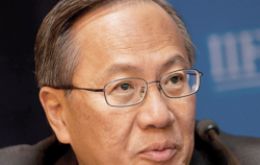
After a week of discussions at the annual IMF assembly in Peru, bankers and policy makers agreed that stemming the rush of investments from emerging markets was one of the most important challenges facing the global economy. But there was little agreement on how to actually do that.
-
Wednesday, October 14th 2015 - 10:49 UTC
$100bn marriage to concentrate one third of the world's beer brewers
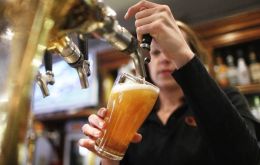
The world's top two brewers, Anheuser-Busch InBev and SABMiller, have agreed in principle to one of the biggest mergers in corporate history after a near month-long courtship resulted in SABMiller accepting an offer worth more than $100 billion.
-
Wednesday, October 14th 2015 - 08:01 UTC
China to the rescue of cash strapped Petrobras with $2bn for a 10-year lease of two platforms
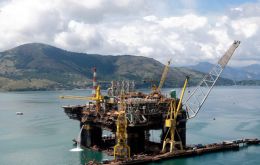
Brazil's state-run oil firm Petroleo Brasileiro SA will raise $2 billion through a 10-year leasing contract with China's Industrial and Commercial Bank of China Leasing, the Brazilian company said in a statement on Tuesday.
